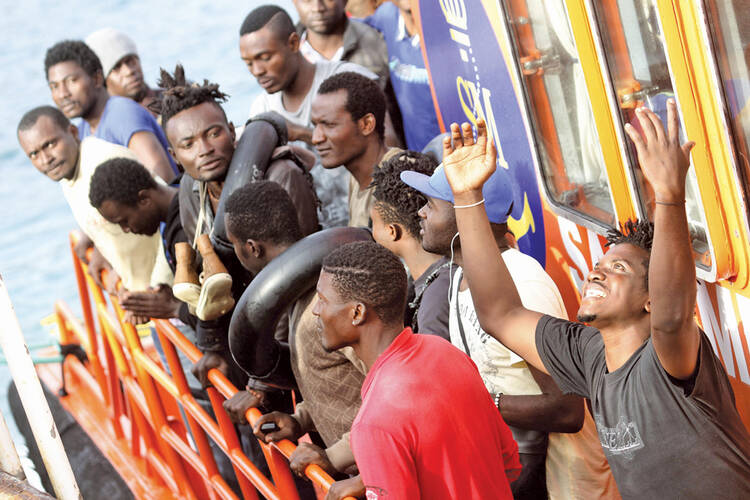Catholic bishops and aid agencies criticized a move by European nations to scale down the rescue of migrants and refugees in the Mediterranean Sea, where hundreds drown each month attempting to reach Europe.
“What we’re seeing is almost a nightmare vision. Any policy which causes people to die must be considered immoral,” said Auxiliary Bishop William Kenney of Birmingham, England, president of the Conference of European Justice and Peace Commissions. “The theology here is quite simple. Everyone is created in the image of God, so we cannot let them die if we can save them. To do so will lead us into an impossible ethical situation,” he said on Oct. 30.
The bishop’s comments came after the British government confirmed on Oct. 29 that it would no longer support search-and-rescue operations in the Mediterranean Sea. The Italian government said it also was ending its program. The British decision reflects a “growing xenophobia,” Bishop Kenney said, suggesting that European citizens must better understand “what war and poverty really mean.”
A spokesman for Caritas Internationalis said rescue programs had been launched “because women and children were dying at sea.” Patrick Nicholson, communications director for the umbrella organization for Catholic charities around the world, urged the European Union to find “common solutions” rather than “unfairly leaving the problem to Italy.”
“With or without these programs, people will continue to place themselves in danger by crossing the Mediterranean, and we’ll have a responsibility to save their lives,” said Nicholson. “It’s impossible for us to countenance hundreds of people being left to die at sea, particularly when there doesn’t seem to be any Plan B apart from building a Fortress Europe,” he said.
Up to 150,000 refugees have been rescued by Italian naval ships since January, compared with 65,000 in 2013, and about 3,000 migrants have drowned this year, according to refugee agencies. Italy’s operation, Mare Nostrum (Our Sea), was launched in 2013 after more than 360 refugees drowned in a boat disaster off the island of Lampedusa.
The government of Premier Matteo Renzi reported on Oct. 29 that it was closing down the operation because it was unsustainable and would be replaced on Nov. 1 by the new Operation Triton. That effort will be run through Europe’s border agency, Frontex, but it will have just one-third of the budget of Mare Nostrum and maintain patrols only within 30 miles of the Italian coast.
The plight of refugees has frequently been noted by Pope Francis. He urged Europeans to “open the doors of their hearts” by welcoming those “who risk their lives at sea to flee war and poverty” during a private meeting on Oct. 1 with survivors of the Lampedusa disaster.
Joyce Anelay, of Britain’s Foreign and Commonwealth Office, said in a statement that her country would not support future rescue missions and believed it was better to “focus attention on countries of origin and transit” and “fight the people-smugglers who willfully put lives at risk by packing migrants into unseaworthy boats.”
The general secretary of the ecumenical Commission for Migrants in Europe, Doris Peschke, said that the rapid increase in “despairing refugees” had been caused by crises in the Middle East and North Africa rather by the E.U.’s rescue missions, adding that other routes would be found if the Mediterranean became too dangerous. She said she believed most Europeans were ready to help refugees and that government policies should reflect those views, rather than “the racist arguments of populist organizations.”
“To imply we should simply leave people to die is a dreadful, cynical response. It has nothing to do with European values, which uphold human rights, including the right to life,” Peschke said.








